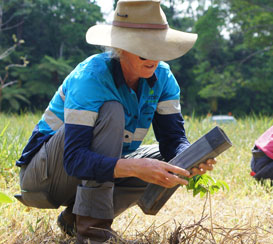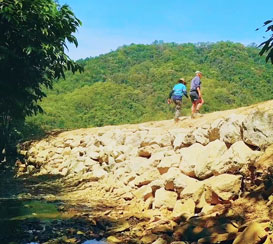WATERWAY HEALTH
PROTECTING & RESTORING HEALTHY WATERWAYS
Poor water quality is second biggest threat to the Great Barrier Reef after climate change.
While climate change is a global issue, there is a lot we can do locally for the Reef by improving water quality flowing off the land.
The Wet Tropics is one of seven Great Barrier Reef catchments, where water is collected by the natural landscape and flows out to the reef lagoon.
Each year the wet season dumps rain into our landscapes which races down the escarpments, picking up pollutants along the way and carrying them out to sea.
Terrain NRM has successfully delivered a number of large Great Barrier Reef programs that have been funded by the Australian and Queensland governments.
These programs have mostly been focused on working with farmers to help them transition to farm practices that present a lower risk to water quality flowing to the Reef, while also maintaining farm productivity and profitability.
Our work involves:
- Supporting farmers to transition to more environmentally sustainable practices
- Trialling innovations including treatment systems like bioreactors
- Repairing riverbanks, gullies and landscapes to reduce sediment runoff and maintain farm productivity
- Developing innovative ecosystem service markets to incentivise and reward landholders to reduce nutrient and sediment runoff to the reef
- Raising community awareness about links between farm practices and reef health.
Current Projects:
- Reducing fine sediment runoff:
Reef 2035 Sediment Reduction - Reducing fine sediment runoff in the Lower Herbert catchment
- Developing a reef water quality strategy:
Reef 2035: Reef Water Quality Roadmap - Coastal and wetlands restoration in the Lower Daintree
- Monitoring progress towards the Reef 2050 targets:
The Paddock to Reef Integrated Monitoring, Modelling & Reporting Program (P2R) - Assessing waterway health condition:
The Wet Tropics Waterway Health Report Card – Delivered through Wet Tropics Waterways





NUTRIENTS & PESTICIDES
The Wet Tropics catchment is a particular hotspot for nutrient and pesticide run-off due to our unique geography and climate:
- 9 short sharp rivers
- exceptionally high rainfall
- intensive farming along the coastal plain
- closeness of the reef to our coast
Terrain is working closely with several partners across the region to reduce the loss of fertilisers and pesticides into waterways.
Dissolved inorganic nitrogen (DIN) is a major focus and many farmers are working hard to trial and adopt practices that enable them to reduce their use of chemical fertilisers and maintain productivity and profitability.
SEDIMENT – GULLY & STREAMBANK EROSION
Loss of soil through gully and streambank erosion are impacting our region’s farm land and waterways. High rainfall and the tropical climate make the Wet Tropics highly susceptible to these issues.
Terrain NRM has been working with graziers, landholders and other partners on landscape repair initiatives ranging from engineered earthworks to revegetation projects. These activities are coupled with workshops for landholders on new soil health and farming practices.
A groundswell of support for regenerative farming practices, and support to repair landscapes is helping to improve the quality of land and water in the Wet Tropics.



























